|
Clerical sex-abuse cover-up in Australian church
By Andrew Lynch
Antipodean Booker-winner Thomas Keneally's new novel tells the story of a liberal priest's uncovering of paedophilia in the Catholic church during the mid-1990s. In an early scene from Thomas Keneally's poignant new novel about clerical sex abuse, a young Australian woman called Maureen Breslin goes searching for her Irish roots on the Donegal coast. She is particularly impressed by an outdoor Mass stone, where fugitive Catholic priests used to hold ceremonies for their followers in defiance of Britain's Penal Laws. Thinking about the "barefooted, shawled and huddled poor" quietly praying in stiff Atlantic gales, Maureen feels an overpowering responsibility to honour their memory. "This stone is my inheritance, I thought. An inheritance of the oppressed, too. How could I let the people who stood here, hungry and ill-clothed, go from my life?" Shortly afterwards, Maureen's faith is put to its most severe test yet. She wants to enjoy normal sexual relations with her husband, but the year is 1968 and Pope Paul VI's encyclical Humanae Vitae has dashed any hopes that the church might ease its ban on contraception. "I could see no way to disobey the encyclical and remain a Catholic, and if I did not remain a Catholic, I would be spitting on my ancestors' Mass stones of Donegal." As these extracts show, Crimes of the Father is anything but an anti-Catholic diatribe. While Keneally certainly does not skirt around the horrors of paedophilia, he is a gentle and compassionate writer far more interested in understanding than condemning. His central premise here is that the church's troubled history created a culture of secrecy and hostility to outsiders - which then allowed a small number of sexually immature priests to get away with truly repulsive crimes. In an author's note, Keneally explains he has experienced this conflict of loyalties himself. He will always be most famous for his 1982 Booker Prize-winning novel Schindler's Ark, a fictionalised treatment of the Nazi industrialist who saved 1,200 Jews from the concentration camps (filmed by Steven Spielberg as Schindler's List in 1993). Long before then, however, Keneally trained for the priesthood and felt deep shame when a nervous breakdown forced him to quit the seminary. "I did so with the conviction that I was letting down not only the universal church but also the traditions of my Irish-Australian clan... some of my forebears in North Cork had starved instead of taking the chance of Famine soup and becoming Protestants... I have come to realise that if you leave the church, the church may not leave you." Crimes of the Father is mostly set in the mid-1990s, when revelations of child abuse were beginning to make headlines in Ireland, Australia and elsewhere. Father Frank Docherty, a liberal priest who was exiled to Canada 24 years ago because of his campaigning against apartheid and the Vietnam War, has returned home to deliver a public lecture about the church's response. By a rather unlikely coincidence, his cab driver at Sydney Airport is also a traumatised ex-nun who confides that she was sexually exploited herself at the hands of a slick young priest called Leo Shannon. As Docherty starts investigating these claims, his personal and professional lives become dangerously entwined. Not only is Shannon now a distinguished monsignor who represents the cardinal in abuse cases, he is also the brother of Maureen Breslin, whom Frank secretly loved during their youth. When a teenage boy overdoses and leaves behind a suicide note naming Shannon as his tormentor, however, some painful ethical decisions cannot be avoided any longer. Crimes of the Father is not a novel packed full of dramatic incident. Instead, it largely unfolds through a series of anguished conversations, with Father Docherty either providing a sympathetic ear or dispensing theological wisdom. The narrative is also broken up by flashbacks told from multiple points of view, giving each major character a chance to make their case. "It was a dating agency," one man says of the confessional box where his life was ruined. "It is for other monsters, too. And one with a high success rate. If you consider raping a child a success." Above all, Keneally's story highlights celibacy as the foolishly inhumane policy that unravelled with such devastating consequences. "A wonderful, mythical beast," is Docherty's wry description. "Much admired, rarely sighted." Celibacy led trainee priests to see women as a forbidden fruit, stunting their emotional growth and causing some of the most troubled to become fixated on children instead. For Irish readers, Crimes of the Father is a useful reminder that sex crimes, cover-ups and religious hypocrisy are by no means exclusive to this country. Even so, it is striking to see how many Celtic surnames pop up in the text: O'Hanlon, Heffernan, Quinlan, Callaghan and others. There are also uncomfortable echoes of our own history in passages that show senior churchmen offering sympathy to victims while simultaneously trying to ensure their silence. Keneally is now 81 and, perhaps inevitably, this book shows some waning of his powers. It contains too many contrived plot twists and a lot of frustratingly stilted dialogue (during one painful sex scene, a doctor says, "Fear not. I am not a man for glamorous lingerie.") Unlike John Boyne's similarly themed A History of Loneliness, it often feels more like a philosophical tract than an actual novel. Still, Crimes of the Father is greatly redeemed by its author's intelligent, thought-provoking analysis - and deserves great credit for treating this sensitive issue without an ounce of sensationalism. Thomas Keneally's North Cork forebears would be proud of him.
|
.
Any original material on these pages is copyright © BishopAccountability.org 2004. Reproduce freely with attribution.
